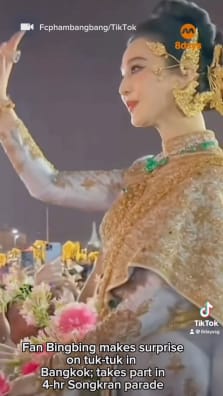Ex-Bond Girl Olga Kurylenko On Her New Killer Haze Sci-Fi Flick And The 10Th Anniversary Of Quantum Of Solace
The Ukrainian-born model-turned-actress says her new movie, Just a Breath Away, is about the wrath of Mother Nature.
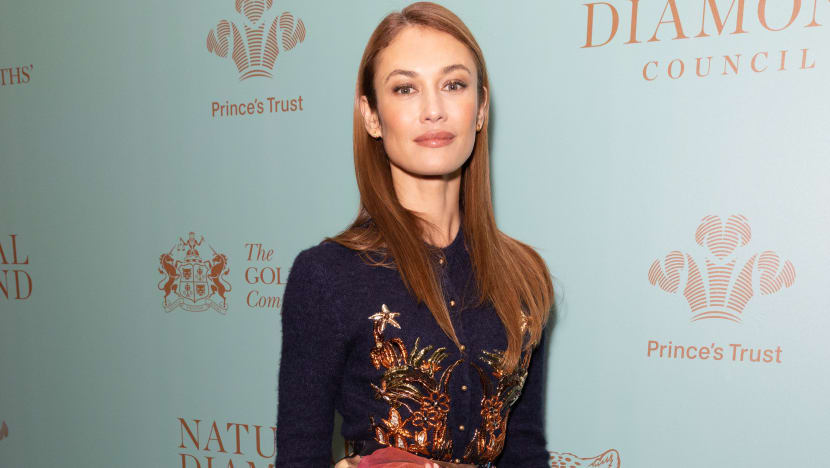
In the French thriller, Just a Breath Away, now in cinemas, Paris is shrouded in a cloud of toxic fog mysteriously released from the ground.
Among the small group of survivors, Anna (Quantum of Solace’s Olga Kurylenko), a physicist, and her estranged husband Mathieu (All the Money in the World’s Romain Duris), who are holed up in the top floor apartment of her building.
The bad news is, they left their daughter Sarah in Anna’s apartment: she’s quarantined in a medical bubble chamber because of a rare disease.
With the mist slowly rising, can the couple reach Sarah before her chamber runs out of battery?
What ensues is a lot of running — and breath-holding, says the Ukranian-born Kurylenko. All of which are done for real, the London-based mother of one quickly adds.
The erstwhile Bond Girl is speaking to 8 DAYS at the Post Bar in The Fullerton Hotel, where she and co-star Duris are guests of the French Film Festival. Do you know what is fake? Even though she plays a scientist, she knows jack about science. “I pretend really well,” says Kurylenko, laughing. She had us all fooled.
8 DAYS: What drew you to Just a Breath Away and how different is it from the American sci-fi movies you’ve been in?
OLGA KURYLENKO: It was different to shoot because it was in French, and it was shot in Paris, France. When I read the script, I was like, Okay, this is a sci-fi catastrophe movie with lots of special effects, and France doesn’t really do this kind of movies. I was thinking about how they were going to pull that off and that was what it intrigued me. It was an ambitious project so I was really curious as to how the French were going to do it because I’ve been in [similar sci-fi films in the US]. I was dying to see how these kind of movies are made in France, and they did it their way. Everything went well with the stunts and the fog. [It was no different than working on an American movie except] this was made in France.
How much of the fog is real?
Whenever we’re in and surrounded by it, it’s all real. The only thing time it was added digitally was when our characters are in the balconies looking down [and on rooftops overlooking the] whole city because we couldn’t cover the city with fog. But whenever we’re in small spaces or rooms, or even in the streets where you see us running, that was all on a set — they built an intersection of the Parisian streets and buildings so that they could fill it up with fog. It was quite hard because they had to wait for hours to fill up the space. Whenever the fog subsided, we have to make more of it.
Could you see anything?
We couldn’t see anything! The visibility was really bad. And what you see it in the film was exactly like that on set! We were like, “Where’s Romain Duris? Where’s the director? Where’s everybody?” You couldn’t see everybody because there was a wall of fog. It was quite challenging like when I was running down the stairs. I remember I was worried. I was like, “I’m going to die here!” Running up the stairs was easier because it was less dangerous. I had to go down the stairs super-fast — and they were very slippery — I couldn’t see where I was placing my foot. [Any misstep and I could] break a leg or fall down. I remember gripping the stair railing thinking, “God, I just can’t fall.” And also, I didn’t run once — we did many takes! So in the film, you see it for a couple of seconds, but I was really running and each time I was thinking, “God, I hope I’m not going to twist an ankle or something.” And there was nothing I could do. I just hope that I [can pull it off without hurting myself]. And the guys with the camera, they were running after me carrying I-don’t-know-how-many-kilograms of handheld cameras. I was worried about them too. I was like, “Guys, please don’t fall.”
It’s never explained in the film what caused the fog and what exactly is it? What is the fog to you?
To me, it’s a metaphor for air pollution, of what we’re doing to our planet. All kinds of things are happening now. The weather changes; the hurricanes are more frequent; it’s hot in the middle of November. In Europe, just a week ago, it was super-hot. That’s not normal. Things like that. We haven’t had any toxic gas come out of the ground yet, but who knows? It can happen, or something like this can happen, but maybe not literally like that. And when that happens, there’s not going to be many survivors. We need to take care of our planet!
Do you have an emergency go-bag?
No, I don’t! I guess I should have one. I know there are some people in the world — and you hear of more and more of them — with bunkers or stocking up on food. Some people are really catastrophe-ready. I haven’t done that (laughs). It’s something to think about, though.
There’s a scene where Anna has to hold her breath and not inhale the fog. Were you pretending to hold your breath or did you do it for real?
I was doing everything for real. It was super-difficult.
How many takes did you do?
Many takes. All I wanted to do was breathe [when the scene was over]! It was hard. But the thing is, if I were faking it, it wouldn’t have the same impact. Because when you do hold your breath and then breathe out for real, it’s a real bloody breath like (makes gasping sound effect).
Did you train for it?
No, but I remember that when I was about to run up the stairs for [for another take], somebody told me that you have to exhale times. Apparently athletes do that.
There are scenes where we see through Anna’s eyes behind a gas mask. Did you feel claustrophobic doing that?
No, I didn’t have a problem with that. You can lock me in a box, I don’t care (laughs).
Why would anyone want to lock you in a box?
Well, in Oblivion, I was in a pod, remember? And they were all worried, “Are you okay in there?!” Because they had to close it and film me sleeping in it. I was like, “No, guys, don’t even open it, it’s noise-free.” Everyone was shouting and I was like, “Keep it closed and leave me alone!” I was lying in the pod and they were, like, “You’re weird.” I was like, “Oh my God, I’m resting.” It was so nice and comfy.
Now, Oblivion is one helluva sci-fi which you starred in. What’s your definition of a good sci-fi story?
Great imagery. Beautifully shot. Because it needs to be impressive. Whatever you see needs to be impressive, terrifying, but yet beautiful in a weird way. It has to be beautiful, even if it’s scary. And also a good story that gets your attention, because the viewer needs to care about the characters. It’s always about survival, so obviously their lives are at stake. So if you really care about the characters, the story works. Pacing is important too.
What are your favourite sci-fi stories?
Blade Runner. I don’t know, Aliens? That was terrifying. I remember it being super scary, but it’s great.
What draws you to a project these days? Is it the talent that’s attached or the opportunity to visit exotic places?
Many things [draw me to a project]. But it’s never about going to places. Before I had a family, I didn’t care about where it was shot. Now, I hope it shoots in London because I don't want to go to any other places (laughs). That’s because I have a family now. Once you have a kid, it’s difficult [to travel]. But anyway, what I’m drawn to is something new, challenging and interesting.
You made a big-budget fantasy flick in China, Empires of the Deep. You shot it in 2010 but because of legal entanglements, the movie remains unreleased. That must’ve been disappointing.
I only spent about two weeks in China; it was a guest role, so we shot it really fast. But yes, it’s a shame, which is why I’m thinking, [if I ever make another movie in China], do one that will be seen. This one didn’t go anywhere.
If a movie isn’t successful, how do you deal with the disappointment?
It’s life. I don’t go crazy and cry. There’s always 50-50 chance [that the movie is going to be a disappointment]. It’s either going to work or it’s not. If it doesn’t, it doesn’t. It’s like. Making movies is a big gamble. Actually, there’s no way to tell which movie is going to work because I’ve done movies which I thought, “Oh my God, this is going to be amazing” but it turned out to be total crap (laughs). Or what I thought was a so-so movie turned out to successful.
Are there movies you regret making?
I never regret. The thing is, there are some movies that didn’t work commercially, but they were the best time I spent on set, like [the Spanish Civil War-themed drama] There Be Dragons, by [The Killing Fields director] Roland Joffe. The movie didn’t work, but filming it was the most enriching, amazing experience because [I got to work with Joffe]. He’s amazing; he gets inside your soul and just sees through you. He just manipulates the actor like an amazing psychologist. Terrence Malick does the same thing in To The Wonder. I don’t think that was a big hit; it’s probably a film that people will be studying because it’s by Terrence Malick. But I had the best time of my life. I will never regret making that. I don’t care that if it didn’t make money; it’s about being there.
Terrence Malick is such an enigmatic figure…
Both Roland and Terrence are amazing directors. When they are next to you, they give you a breath of fresh air. You feel like this is what you’re here for, that this is the meaning of your life. You’re meant to do this. [Everything you’re doing on the film] has meaning. You have this almost out-of-this-world inspiration. With powerful people, you feel their energy. It’s not just what they say, but something that comes from within. You feel it on another level.
This year you also starred in Johnny English Strikes Again. In a weird way, it sorta marks the 10th anniversary of Quantum of Solace. It isn’t one of the more memorable Bond movies. Daniel Craig blamed the writers’ strike for how it turned out. What are your memories of making the movie?
Looking back now, I realise how green I was. I was still new to the industry. It happened to me so fast because I hadn’t really done much before; I had only done four movies. You look at some of the other actors, and you realised that they have done 20 films. It’s good in a way because I started acting late at my age, so it was good that it happened pretty fast because I couldn’t have waited longer (laughs). So yes, I did have to learn a lot, and I learnt a lot. What I learnt a lot about doing all the stunts. Also, I got really prepared for action films because it was the first time I did an action film of that caliber. Just before [Quantum of Solace], I did Hitman, but I wasn’t really doing any stunts in that one. Suddenly in Quantum of Solace, I was the warrior; I had to do the fighting myself. So I had to go through all that training with the stunt people, and perform the stunts myself. So that was super interesting. The movie really did change my life and the fact that I was able to be an actor who can do action. Because even till today, people would hire me because they go, “Oh, you know how to do [that stunt] because we saw you do [it in Quantum of Solace].”
Weren’t you worried about the stigma attached to being a Bond Girl?
People were telling me about that but I wasn’t going to let that happen (laughs). It’s about what you do [with the opportunities given by that role]. [Bad] things don’t just happen to you. If it does happen, you don’t just sit there [and whine about it]. We have our will and it’s about us using it to change or lead our life in a certain way.
Just a Breath Away (PG) is now in cinemas.
Photo: TPG News/Click Photos










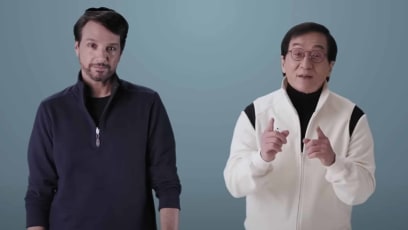
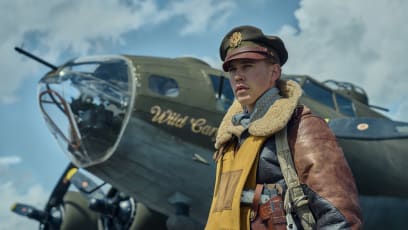
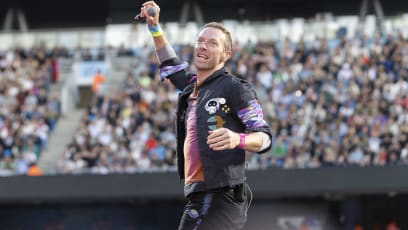


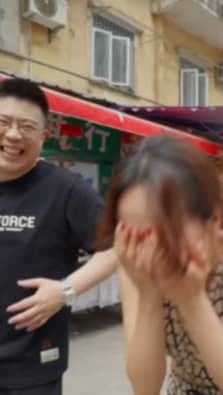
![Boss of Rui Ji chicken rice used to own a tattoo parlour! Talk about a career change! Link in bio to read more
📍Rui Ji Chicken Rice
Blk 93 Toa Payoh Lor 4,
#01-48, S310093
📍148 Beach Road,
#B1-01 The Gateway,
S189720
📍Blk 305 Ubi Ave 1,
#01-179, S440305
[till 16 Apr 2024]
https://tinyurl.com/5dudypkh](https://onecms-res.cloudinary.com/image/upload/s--9s0hbGvI--/c_fit,h_396,w_223/f_auto,q_auto/v1/8days-migration/18015522113203478.jpg?itok=EX3xKSNq)
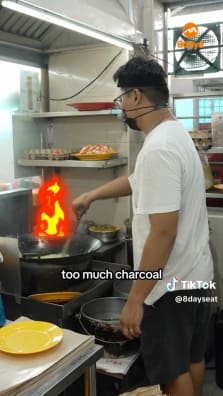
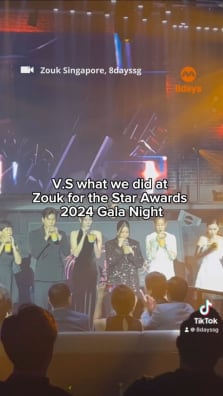
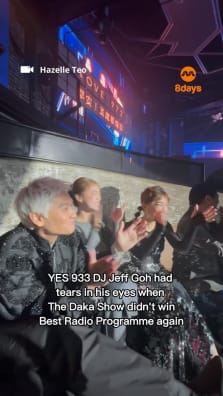
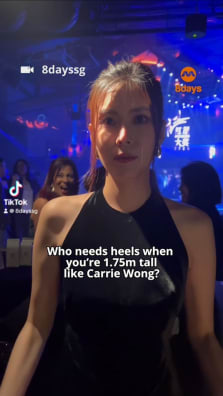

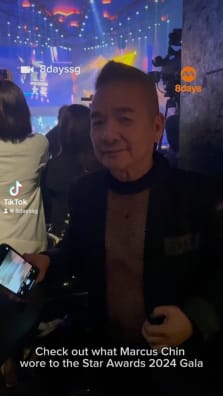
![We stan a kind-hearted boss with a good heart! 💕 Link in bio to read more
📍Rui Ji Chicken Rice
Blk 93 Toa Payoh Lor 4,
#01-48, S310093
📍148 Beach Road,
#B1-01 The Gateway,
S189720
📍Blk 305 Ubi Ave 1,
#01-179, S440305
[till 16 Apr 2024]
https://tinyurl.com/5dudypkh](https://onecms-res.cloudinary.com/image/upload/s---y3eV-Ts--/c_fit,h_396,w_223/f_auto,q_auto/v1/8days-migration/17999638880322602.jpg?itok=Tiqm3SVR)
